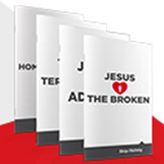God's Majesty and Your Nothingness
By Skip Heitzig
Over the course of Job's suffering, he cried out again and again for God to answer Him. In chapter 38, God finally spoke—and, boy, did He speak. Amazingly, He never answered the big question Job had: How can a good God allow evil to exist, especially in my life? But perhaps even more amazingly, Job still submitted to Him. What did Job discover to get to that point?
Speaking to the Lord in chapter 42, he said, "I know that You can do everything, and that no purpose of Yours can be withheld from You…. I have heard of You by the hearing of the ear, but now my eye sees You. Therefore I abhor myself" (vv. 2, 5-6).
The first thing Job discovered was the majesty of God: He is omnipotent (all powerful) and controls everything (see v. 2). He's powerful enough to make everything in the universe and powerful enough to take care of anything in your personal life.
The second thing Job discovered was the inadequacy of man: "I have heard of You by the hearing of the ear, but now my eye sees You. Therefore I abhor myself" (vv. 5-6). In other words, "You're God; I'm not. I am nothing in comparison to You." It's amazing how quickly our appraisal of ourselves changes when we encounter the living God; in seeing His majesty, we see the nothingness of ourselves.
The third thing Job discovered was the generosity of God toward man: "And the LORD restored Job's losses…. Indeed the LORD gave Job twice as much as he had before…. The LORD blessed the latter days of Job more than his beginning" (vv. 10, 12). God loves to lavishly bless His people. After He showed Job His majesty and Job confessed his inadequacy, God demonstrated His generosity.
These three amazing discoveries led Job to do something: "Therefore I abhor myself, and repent in dust and ashes" (v. 5). What on earth did Job have to repent of? Well, he had to repent of pride, of his attitude in demanding that God owed him an answer for why he was suffering, and of not having known God better. Essentially, he was saying, "I don't need to know why I'm suffering. I just need to know God better."
That's what discovery does: it must lead to decision. Revelation must lead to repentance. If you were to ask Job what he learned through all of this, I think he would say, "God knows what He's doing. I don't get it, but I don't need to get it. I don't need to know why. And I repent. God knows what He's about. I can rest in that." And so can we.
Copyright © 2018 by Connection Communications. All rights reserved.
Jesus Loves People Booklets by Skip Heitzig
People have a deep desire to be loved. But sometimes, the people who need love the most are often the most rejected—even by the church. Get a glimpse of God's relentless love for all people in this collection of all four Jesus Loves People titles, including Jesus Loves the Broken and Jesus Loves Addicts. If Jesus loves people, shouldn't we?
For more from Skip Heitzig, visit ConnectionRadio.org, and listen to today's broadcast of The Connection with Skip Heitzig at OnePlace.com.



